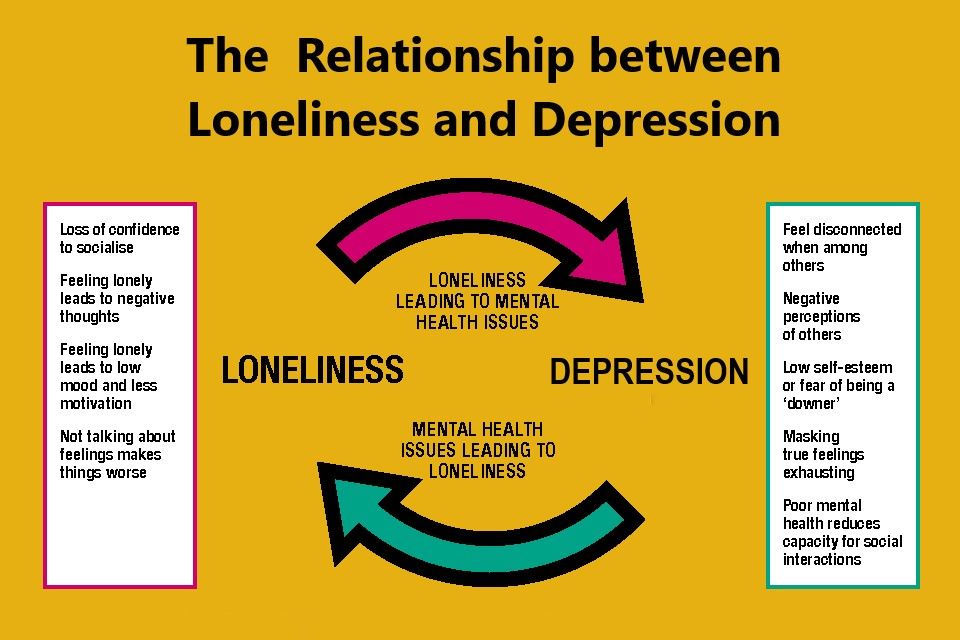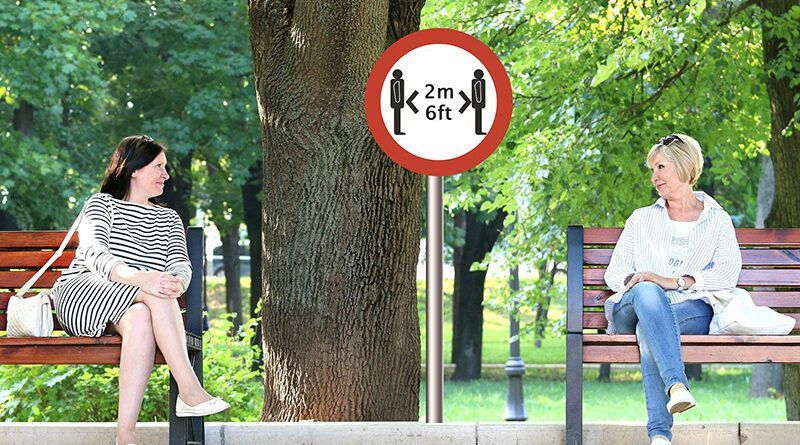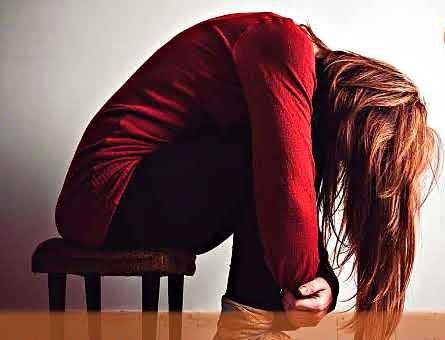The Relationship Between Loneliness and Depression
The Relationship Between Loneliness and Depression

Am I lonely or depressed — and does it even matter? The line between loneliness and depression can seem quite blurry. Does one cause the other? Are they interchangeable? How do I know which one I’ve got? Is one just a symptom of the other? Here we look at their similarities, differences, and the relationship between them. Whatever you’ve got – having greater awareness can only be a good thing.

Similarities between Loneliness and Depression
There can be similar feelings associated with both loneliness and depression so we may find it difficult to recognise where each is in play. Often they can have some of the same symptoms, making it difficult to distinguish between them. Here are some shared symptoms:
- Feelings of Sadness: Both loneliness and depression often involve a pervasive sense of sadness or emptiness.
- Isolation: Those with loneliness or depression may withdraw from social interactions and isolate themselves from others.
- Changes in Sleep Patterns: Both conditions can lead to disruptions in sleep, including difficulties falling asleep, staying asleep, or oversleeping.
- Fatigue: Feelings of exhaustion and low energy are common in both loneliness and depression.
- Negative Thoughts: Persistent negative thoughts about oneself, life, and the future, are characteristic of both loneliness and depression.
- Difficulty Concentrating: Individuals may find it challenging to concentrate or make decisions due to the cognitive impact of both conditions.
- Loss of Interest or Pleasure: A diminished interest in activities that were once enjoyable is a common symptom of both loneliness and depression.
- Changes in Appetite: Loneliness and depression can lead to changes in appetite, resulting in either increased or decreased food intake.

Differences between Loneliness and Depression
Here’s the big difference between loneliness and depression:
Loneliness - is a subjective transient feeling.
Depression - is a complex mental health condition.
Although loneliness may be uncomfortable, it’s a temporary emotional state directly linked to your desire for connection and belonging. Once these needs are fulfilled, your sense of loneliness will diminish.
In contrast, depression goes beyond the need for connection. For those experiencing depression, engaging in social interactions can provide a temporary distraction, but may not consistently alleviate the more complex challenges of depression. Even in the company of your partner or best friend, feelings of fatigue, emptiness, and difficulty socially engaging may persist. If left unaddressed the symptoms of depression can persist for extended periods, escalating in severity over time.

The Connection Between Loneliness and Depression
The connection between depression and loneliness is a brutal one: Depression can cause you to isolate yourself, and feeling lonely makes depression worse. Sadness is a very normal reaction that results from loneliness when we’re wanting to spend time with other people, but we’re not able to. So naturally this can lead to, or exacerbate, depression. This creates a vicious cycle, where loneliness and depression can reinforce each other. While loneliness alone may not always lead to depression, it does play a crucial role in influencing and intensifying depressive tendencies.
Loneliness feeds Depression - It’s important to acknowledge that loneliness is considered a significant psychological factor contributing to the development and worsening of depression. The absence of meaningful social connections, and the accompanying emotional support provided through personal relationships, can negatively affect our thinking. It can give rise to negative thought patterns, feelings of worthlessness, and distorted perceptions about our relationships with others. These are common elements associated with depression.
Connecting with others isn’t just an enjoyable way to pass the time. It’s a pretty important aspect of our well-being. Humans are naturally social creatures, and not getting enough social interaction can have a serious impact on our mental and physical health. Prolonged loneliness can also trigger stress responses in our brain and body. This can influence neurobiological processes and increase our vulnerability to depressive symptoms. With this in mind, developing social connections and maintaining emotional well-being becomes very important in how we approach and treat depression.
Depression feeds Loneliness - Depression affects our motivation to engage with others, making it even harder to ask for support. Having no interest in social interactions means you’re more hesitant about reaching out for help when you need it. Depression can cause you to experience feelings of worthlessness, guilt, or hold the belief that others have no interest in spending time with you. Depression can also take away your energy to initiate connections. And so the cycle continues.
In The End:
Determining the cause of our emotional distress is always a good first step toward managing unwanted feelings. So YES - it does matter whether you’re dealing with loneliness or depression. It’s important to understand the difference between them so that we can recognise what we have, and then use the most effective approach for improving our situation. Both may have some shared symptoms, but their causes, longevity and long-term effects can differ. They are very much connected although it’s also common to have one and not the other. For those that experience either, a vicious cycle can be created with both feeding off each other. This is a very real scenario and one that needs to be addressed. A range of different therapeutic approaches and interventions are available that can be used to work with these debilitating conditions, and positive outcomes are very much achievable. Firstly, we need to recognise the interconnectedness of these factors and their importance in our overall well-being.
To find out more about Loneliness Counselling click here, for help with Depression click here. Or go to Contact Page to make an enquiry.










